All products featured are independently chosen by us. However, SoundGuys may receive a commission on orders placed through its retail links. See our ethics statement.
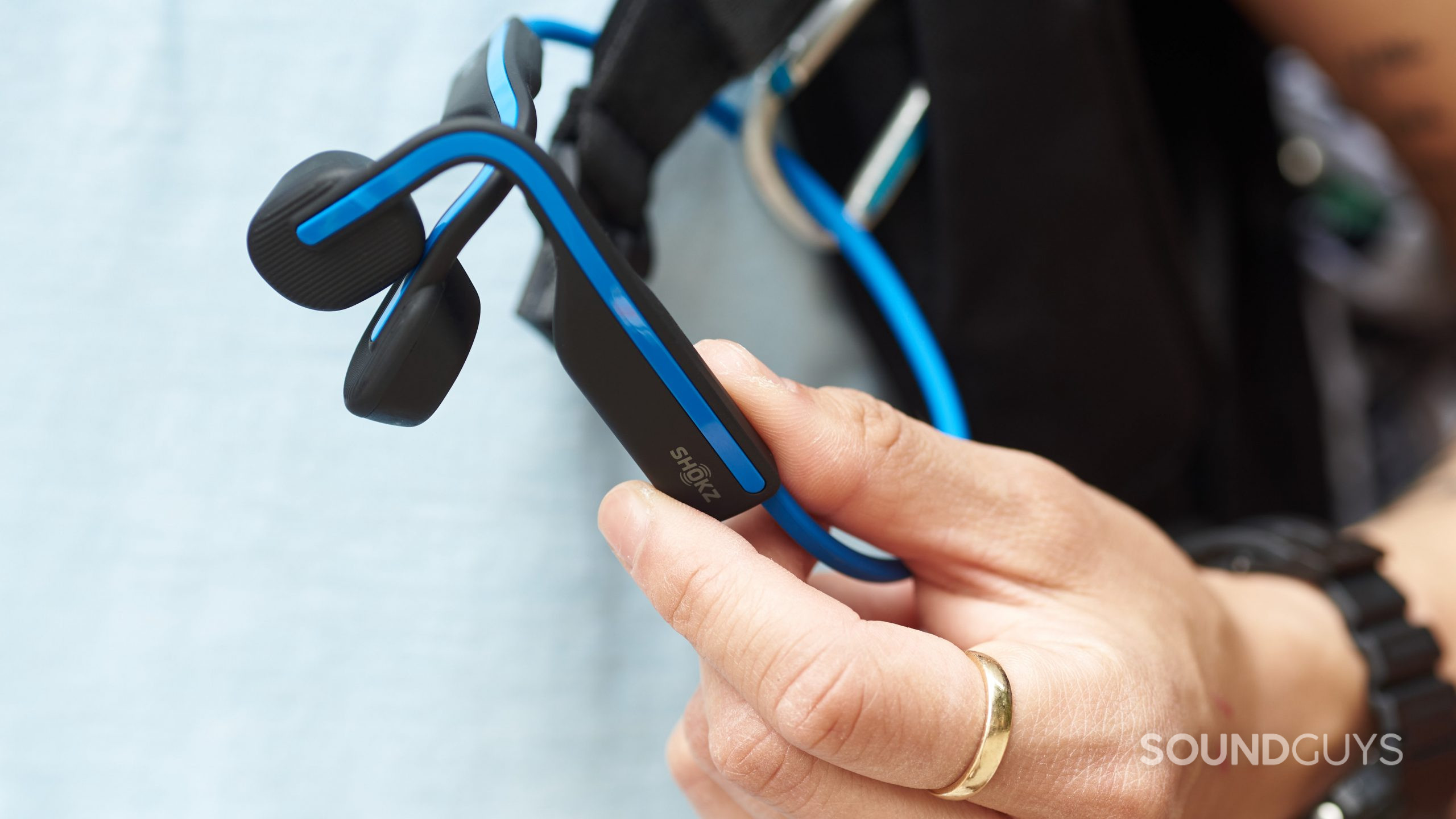
Shokz OpenMove review
Published onOctober 24, 2024
Shokz OpenMove
Few headphones effectively let you hear your music and the world around you. Many wireless earbuds allow you to artificially hear your surroundings via transparency mode, and the AirPods leave your ears unsealed to keep you plugged into the environment. Still, both of these options have compromises. Enter the Shokz OpenMove. These pedestrian bone conduction headphones fit securely and let you hear the world as you naturally would.
We spent two weeks with the OpenMove bone conduction headset and learned everything you need to know before buying this niche product.
Editor’s note: this review was updated on October 24, 2024, to update the formatting to match our current style.
Anyone who spends a lot of time outside can benefit from the OpenMove bone conduction headphones. These won’t block your ear canals at all, which has two benefits: they leave you aware of your surroundings and virtually extinguish your risk of an inner ear infection. A design like this is also advantageous for those who use in-the-ear (ITE) or invisible hearing aids.
What’s it like to use the Shokz OpenMove?
Like all bone conduction headphones, you wear the Shokz OpenMove by placing the “ear” pieces on your cheekbones instead of into your ear canals. Don’t try to shove those rounded buds into your ears; this will lead to discomfort, and the headset won’t even stay in place. Instead, drape the buds over and in front of your ears—headband tension will keep everything in place. Wiggle the pieces around while music plays to get the best sound.
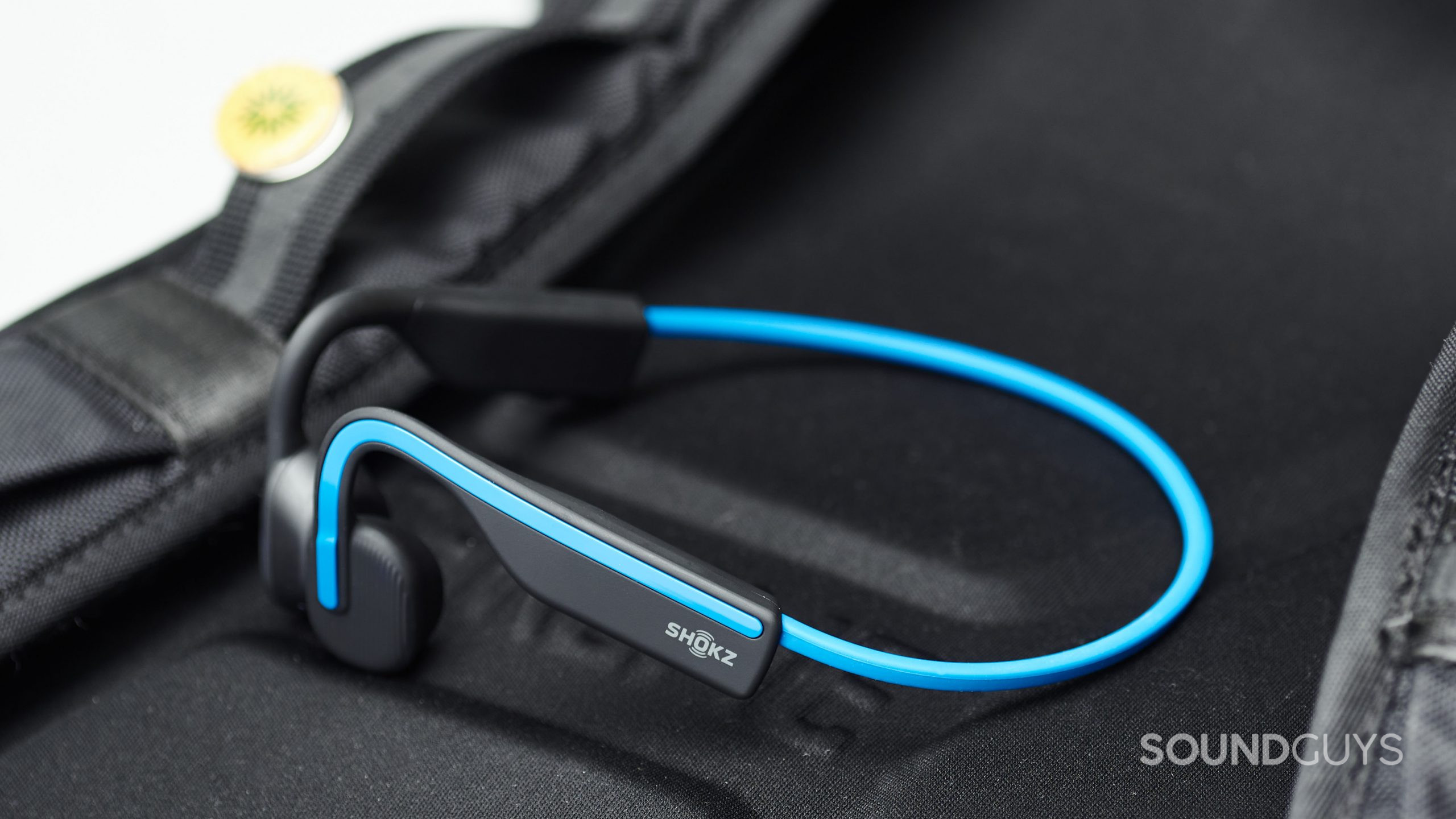
Because of the fit, you may notice that mere millimeters make all the difference in comfort and sound quality. If you eat while listening to podcasts, you may want to grab an extra set of non-bone conduction headphones. The chewing motion shifts the headset in and out of place, leading to a jerky listening experience. One drink of water, and everything sounds good, but then a big bite of the burger will move the headset off my cheekbones and make things sound distant.
When I wear my contacts and don’t eat, the 29-gram OpenMove is comfortable. I can wear the headset for a couple of hours before giving my skull a break. Interestingly, the OpenMove occasionally slides back off my cheekbones and rubs against my tragus, forcing me to readjust. I don’t run into this with the slightly lighter Shokz OpenRun (26 grams).
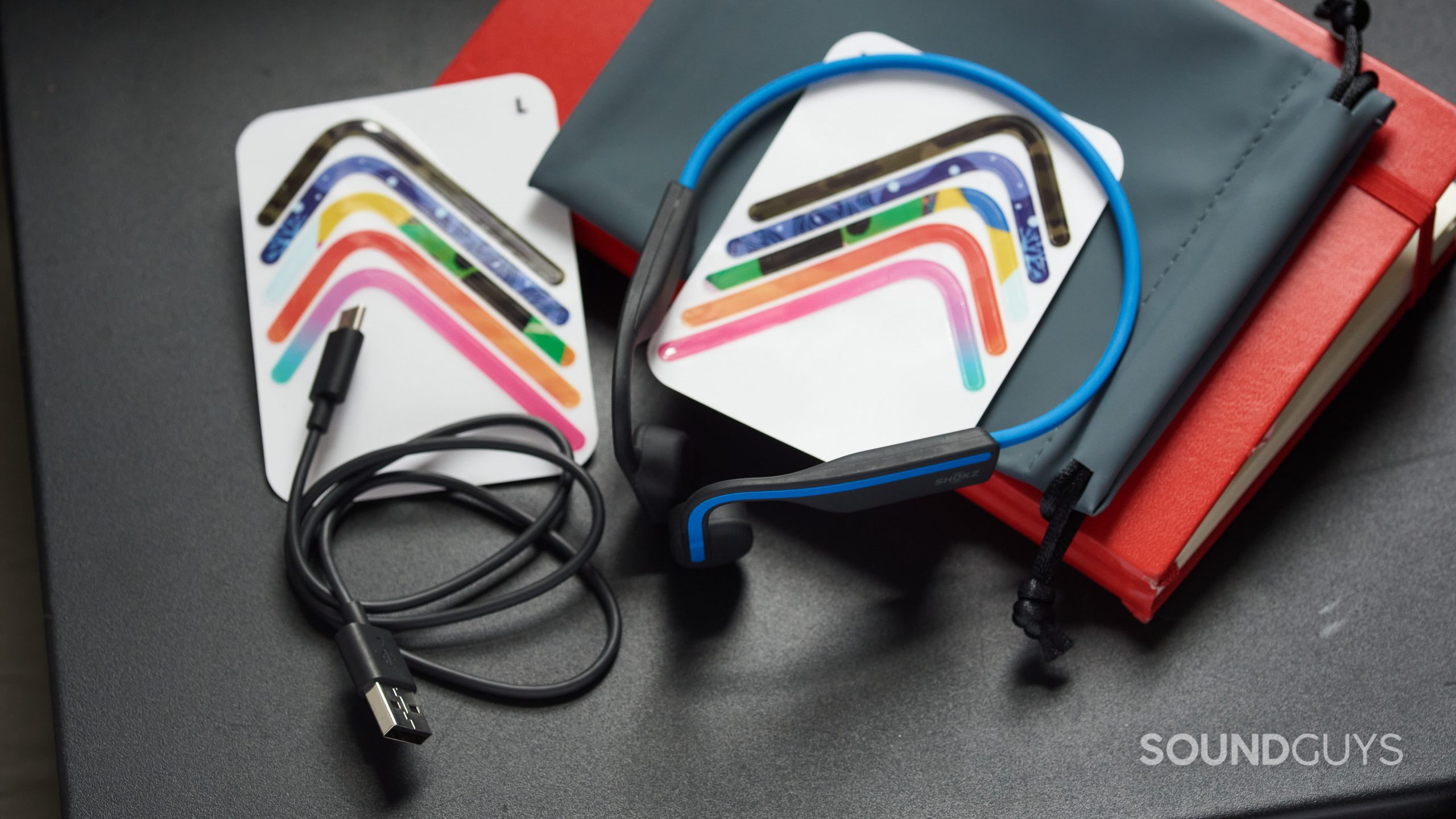
Things get more chaotic when I wear the headphones with glasses because the arms gently displace the OpenMove. Adding a mask into the mix with glasses and the OpenMove feels a little out of hand. The experience would probably be even more crowded with long hair.
You get a few color options with the OpenMove comes in grey, white, blue, or pink, but you can further customize the headset with some slim stickers that Shokz includes in the box. You can use these on the piping that wraps around the side of your head. Aside from that, you also get a drawstring bag and USB-C charging cable.
How do bone conduction headphones work? Are they safe?
First thing’s first, yes, bone conduction headphones are safe to use. The technology has been around for centuries, and if you’re worried about Bluetooth safety, don’t be; it’s safe.
Bluetooth and bone conduction are two perfectly safe technologies.
How bone conduction technology works: The headphones convert the digital signal from your phone into mechanical energy that vibrates through your cheekbones, bypassing your outer ear. Everyone’s bone structure is different, though, so those with higher cheekbones may need to rest the headset higher on their face.
How do you control the Shokz OpenMove?
Like other Shokz headphones, the OpenMove has just three buttons for controlling the volume, playback, and calls. Unlike Shokz’s flagship headset, the volume buttons are clearly separated on the OpenMove, making it easier to operate with gloves on. A multi-function button is cleverly designed into the left earpiece and perfectly blends into the rest of the headset.
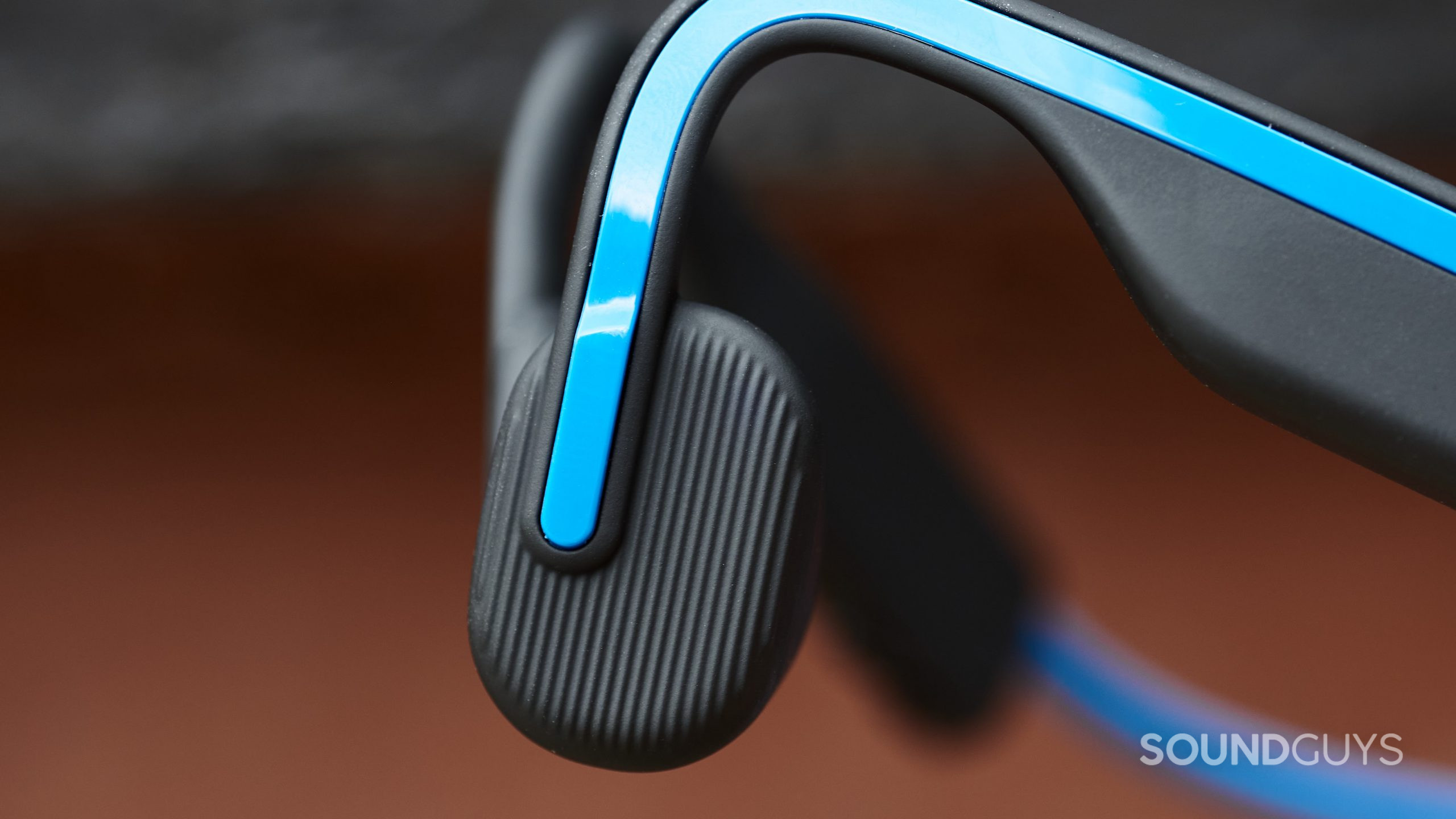
The only downside to the onboard controls is that a loud beep plays whenever you press a button. The tone is quite loud, so if you click the button to pause music while it plays at a low volume, you may find it jarring. There is no mobile app for the OpenMove, so you can’t toggle these tones off. As of May 19, 2023, the Shokz app only supports the OpenRun Pro.
| ONE PRESS | TWO PRESSES | THREE PRESSES | PRESS AND HOLD (2s) | PRESS AND HOLD (3s) | |
|---|---|---|---|---|---|
MULTI-FUNCTION | ONE PRESS
| TWO PRESSES
| THREE PRESSES
| PRESS AND HOLD (2s)
| PRESS AND HOLD (3s) |
VOLUME UP | ONE PRESS
| TWO PRESSES | THREE PRESSES | PRESS AND HOLD (2s)
| PRESS AND HOLD (3s)
|
VOLUME DOWN | ONE PRESS
| TWO PRESSES | THREE PRESSES | PRESS AND HOLD (2s) | PRESS AND HOLD (3s) |
VOLUME UP/DOWN TOGETHER | ONE PRESS
| TWO PRESSES | THREE PRESSES | PRESS AND HOLD (2s) | PRESS AND HOLD (3s)
|
Are the Shokz OpenMove good for working out?
Yes, the OpenMove can be a strong workout companion, but only for specific kinds of exercise. It performs best when rock climbing. I can hear my friends while warming up on the wall, and the headset doesn’t jostle out of place. The dust-resistant build is a rare feature among workout headphones in this price range, and it brings me solace as I chalk up my hands.
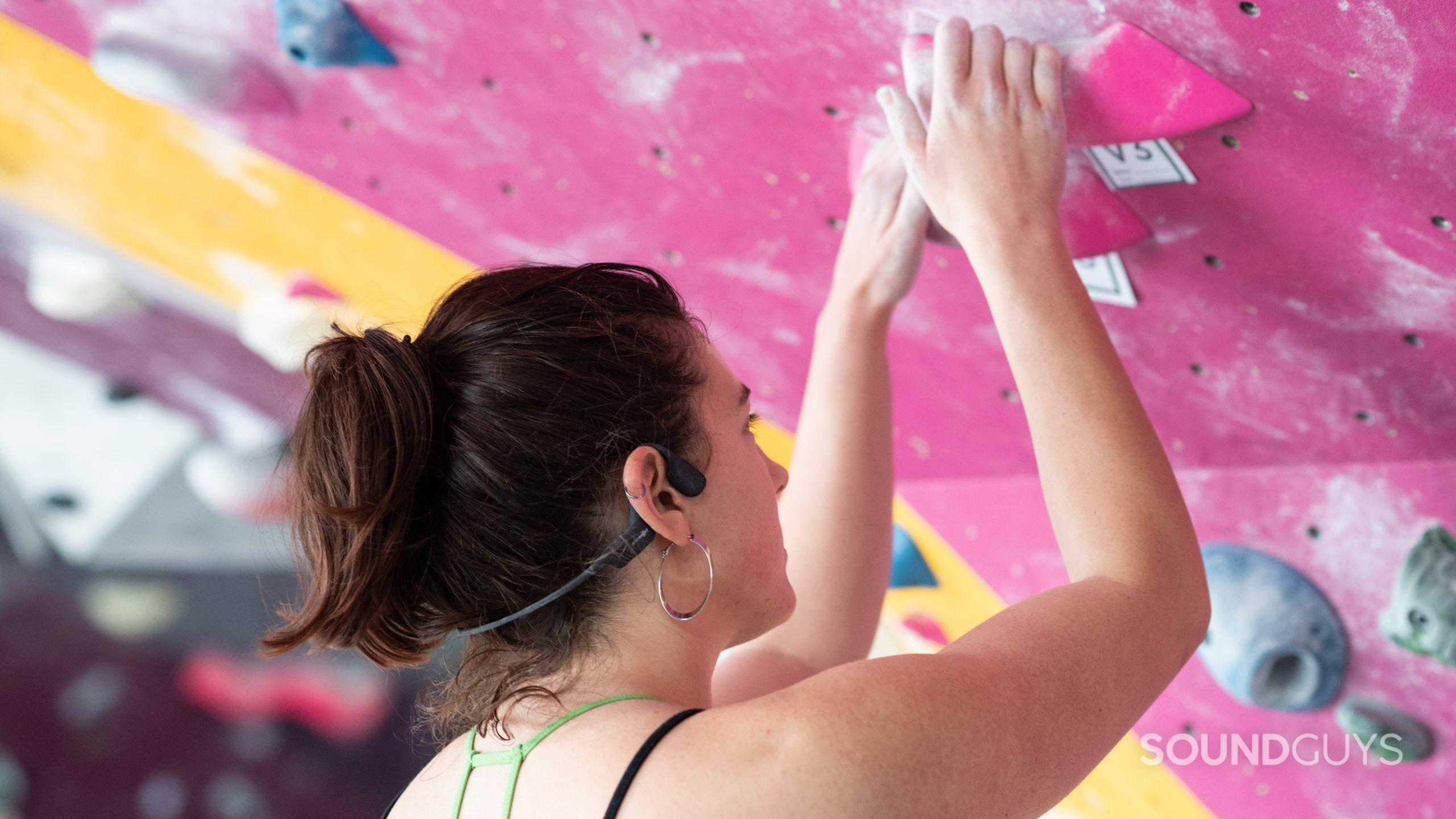
Running and cycling are these headphones’ bread and butter, but there are some quirks. The more vigorous head-bobbing motion when sprinting sometimes makes the OpenMove a bit out of place. Another thing for bike commuters: the headband is difficult to fit with a helmet. Often, I need to deliberately place my helmet so as not to interfere with the band and overall fit.
The OpenMove works for weightlifters who stand upright for most of their workouts. However, the minute you go prone for a bench press, the headphones will slide forward on your face, and you won’t hear your music. This is true for every bone conduction headset I’ve tested simply because the band stiffly hangs behind the wearer’s head.
How do the Shokz OpenMove connect?
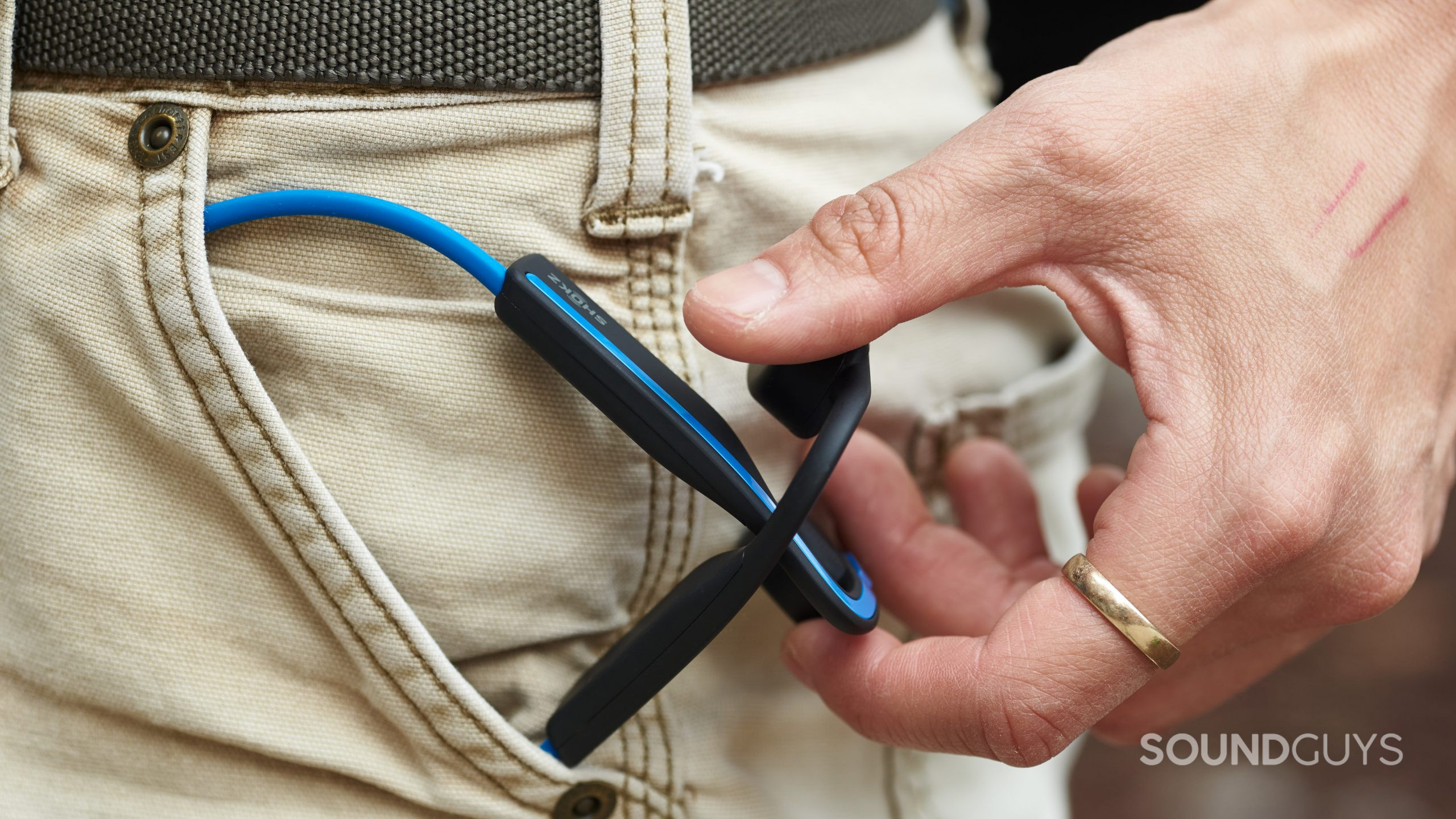
Bluetooth 5.1 keeps the OpenMove connected to your Android phone or iPhone as long as you remain within the 10-meter wireless range. You can stream over the SBC Bluetooth codec. There’s no point in adding high-quality codec options to bone-conduction headphones since auditory masking would nullify those sound quality benefits anyway. You do get multipoint connectivity with OpenMove, which is a nice feature for the productive among us.
How long does the Shokz OpenMove battery last?
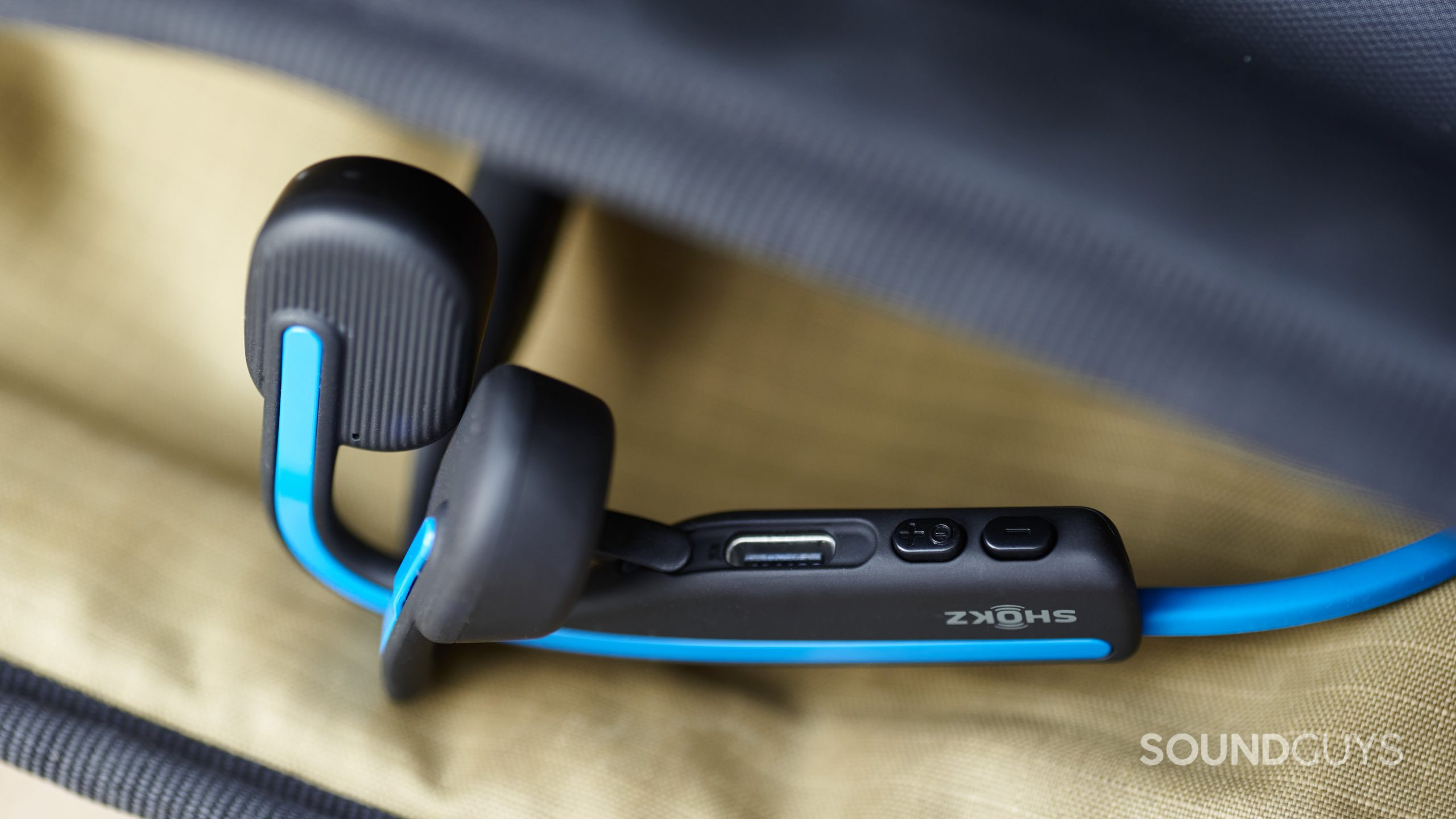
According to Shokz, the OpenMove li-polymer battery lasts 6 hours and takes two hours to recharge. This headset does not offer fast charging, but it supports USB-C instead of the proprietary charging method found on other Shokz headphones. Officially, the headset can last up to 10 days on standby, which aligns with my experience.
Does the Shokz OpenMove block out noise?
Purposefully, the Shokz OpenMove does not isolate you from your surroundings. These headphones are designed to keep your ears free to hear everything going on around you while simultaneously letting you hear your music. If you’re looking for a headset with passive isolation or active noise canceling (ANC), there are plenty of earbuds and headphones for you to choose from.
Hold up, something’s missing:
This article’s frequency response is absent from this review because our Bruel & Kjaer 5128 test fixture cannot accurately measure the headset’s frequency response. The isolation chart is absent because, well, the headphones don’t do anything to block out sound and they’re not supposed to.
How does the Shokz OpenMove sound?
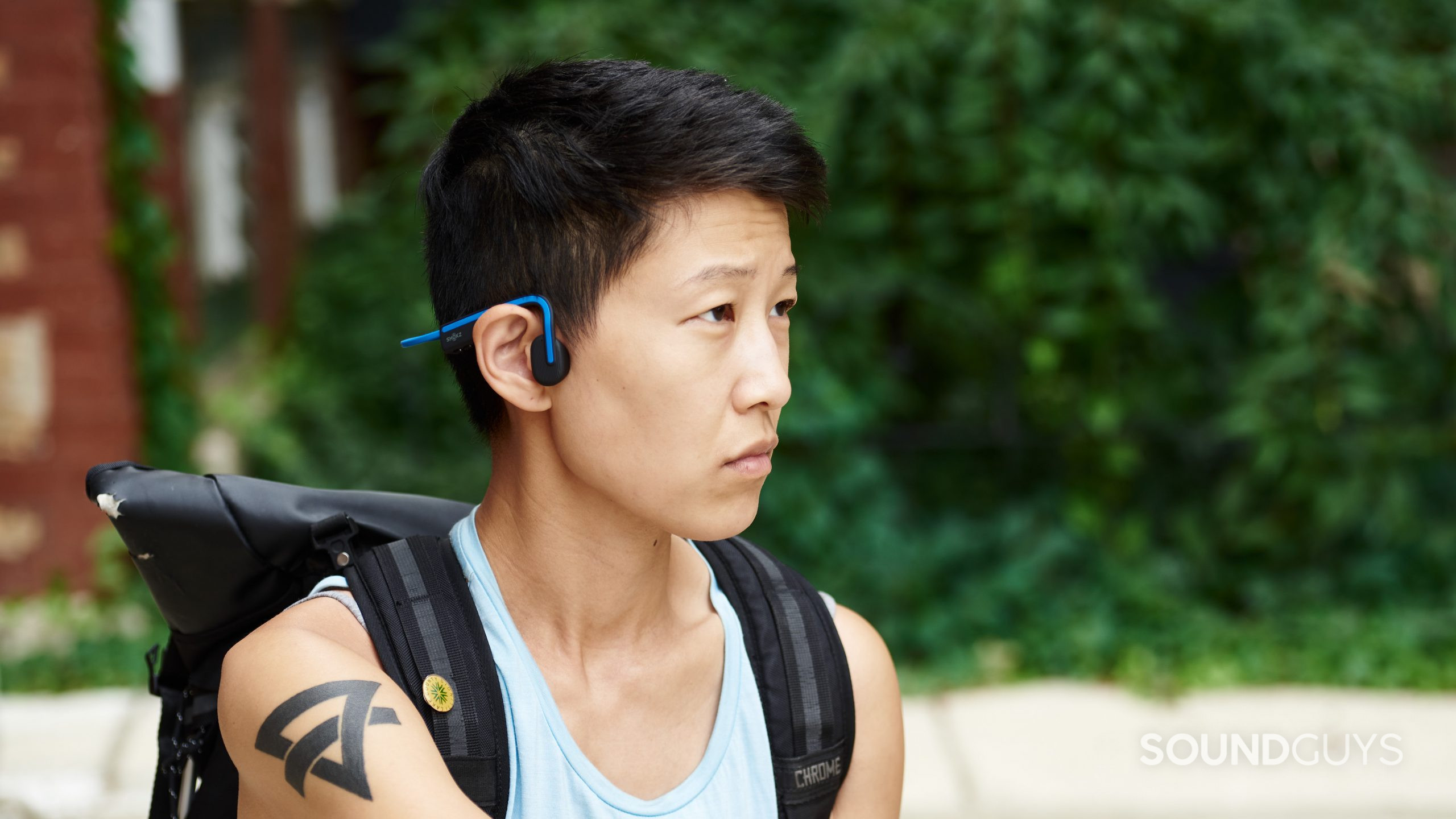
For bone conduction headphones, the Shokz OpenMove sounds just fine. It uses PremiumPitch 2.0, which optimizes the midrange and treble response to account for the unoccluded fit. Even with PremiumPitch 2.0, you won’t hear much bass from this headset, and there’s no bass-boost EQ setting. What you do get is the option to cycle between the “human voice” and “standard” EQ modes by pressing the volume up/down buttons at the same time. The former is ideal for spoken-word content or phone calls, while the latter is more for general use.
Lows, mids, and highs
In Dennehy by Serengeti, the bassline is nearly imperceptible, but this is expected because of how the headphones fit. Bass heads will never be satisfied by a headset like this, but it does have some redeeming audio qualities. Serengeti’s vocals come through clearly as long as I keep the OpenMove buds on my cheekbones. The strings throughout the refrain are easy to hear, too (1:59).
Sound quality isn't the OpenMove's strong suit, but it's not supposed to be.
While I haven’t discovered anything new in my favorite tracks, the OpenMove reproduces a fine enough sound for general-purpose use. These headphones underscore my regular walk to the corner store, and that’s all most people will want from their headphones. Well, that and the ability to make phone calls with them.
Can you use the Shokz OpenMove for phone calls?
The OpenMove house a dual noise canceling microphone system that sounds fine for phone calls. It blocks out predictable background noise like an A/C unit and light wind, as you can hear in the demo below. Unfortunately, the OpenMove transmit incidental sounds (jangling keys) that arise while you talk. These headphones are an alright option for phone calls, but if you want something better, check out some of our favorite headphones for work.
Shokz OpenMove microphone demo (Non-standardized):
How does the microphone sound to you?
Should you buy the Shokz OpenMove?
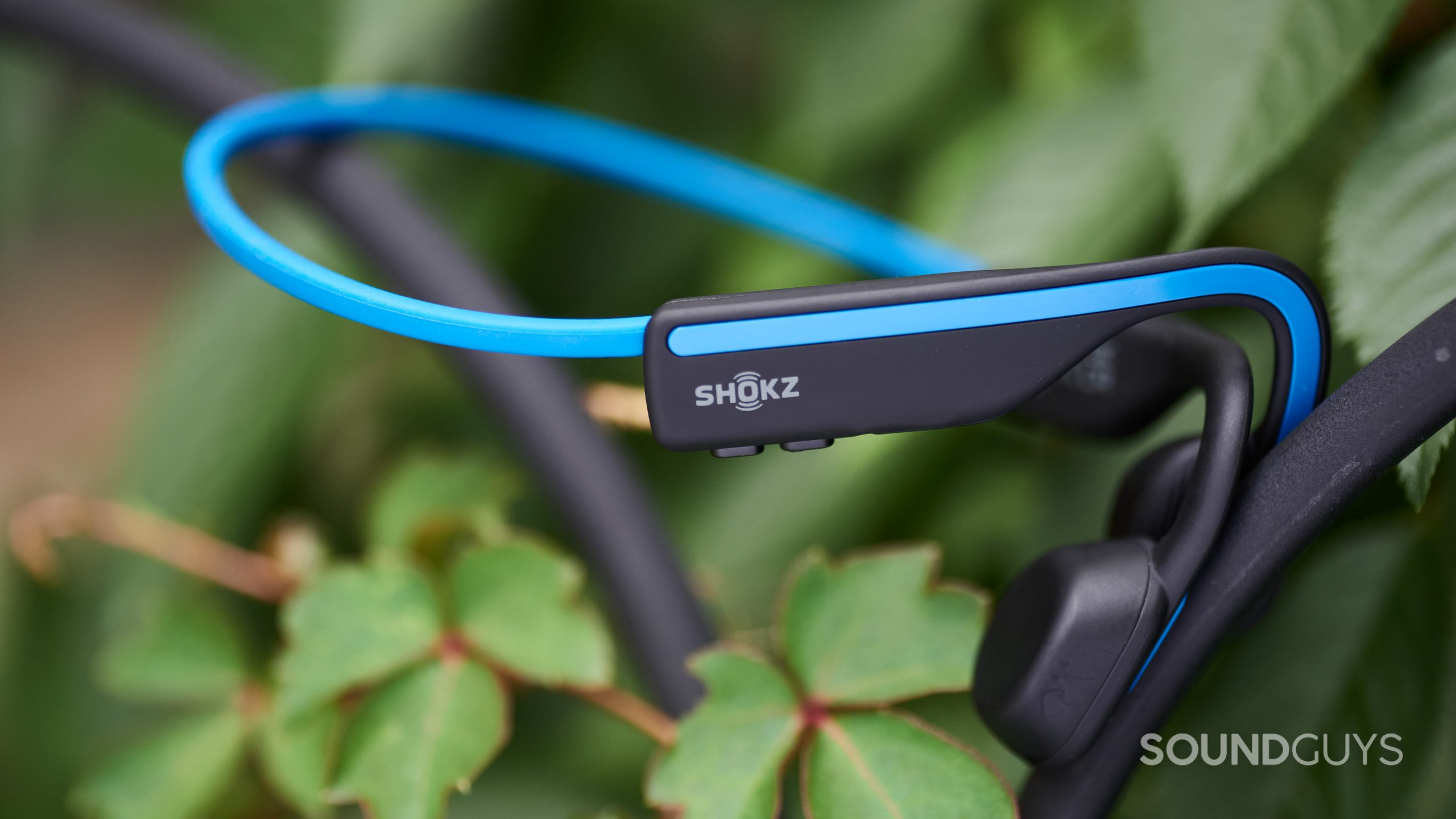
The Shokz OpenMove proves a solid option for everyone, from athletes to pedestrians. While they may not look as modern and sleek as flagship true wireless earbuds, the OpenMove offers something incredibly attractive: safety. At $79, these headphones are bound to serve you well and are one of the few effective options for those who wear specific kinds of hearing aids. It’s disappointing that the audio quality changes so drastically with minimal jaw movements, but this comes with the territory of bone conduction headphones.
If you want a headset to accompany you on your daily commute or monthly work flight, the OpenMove isn’t it. For those purposes, get noise canceling earbuds or headphones. These options can be expensive, but they don’t have to be, as long as you’re willing to make concessions on build quality or default sound.

What’s the difference between the Shokz OpenRun and OpenMove?
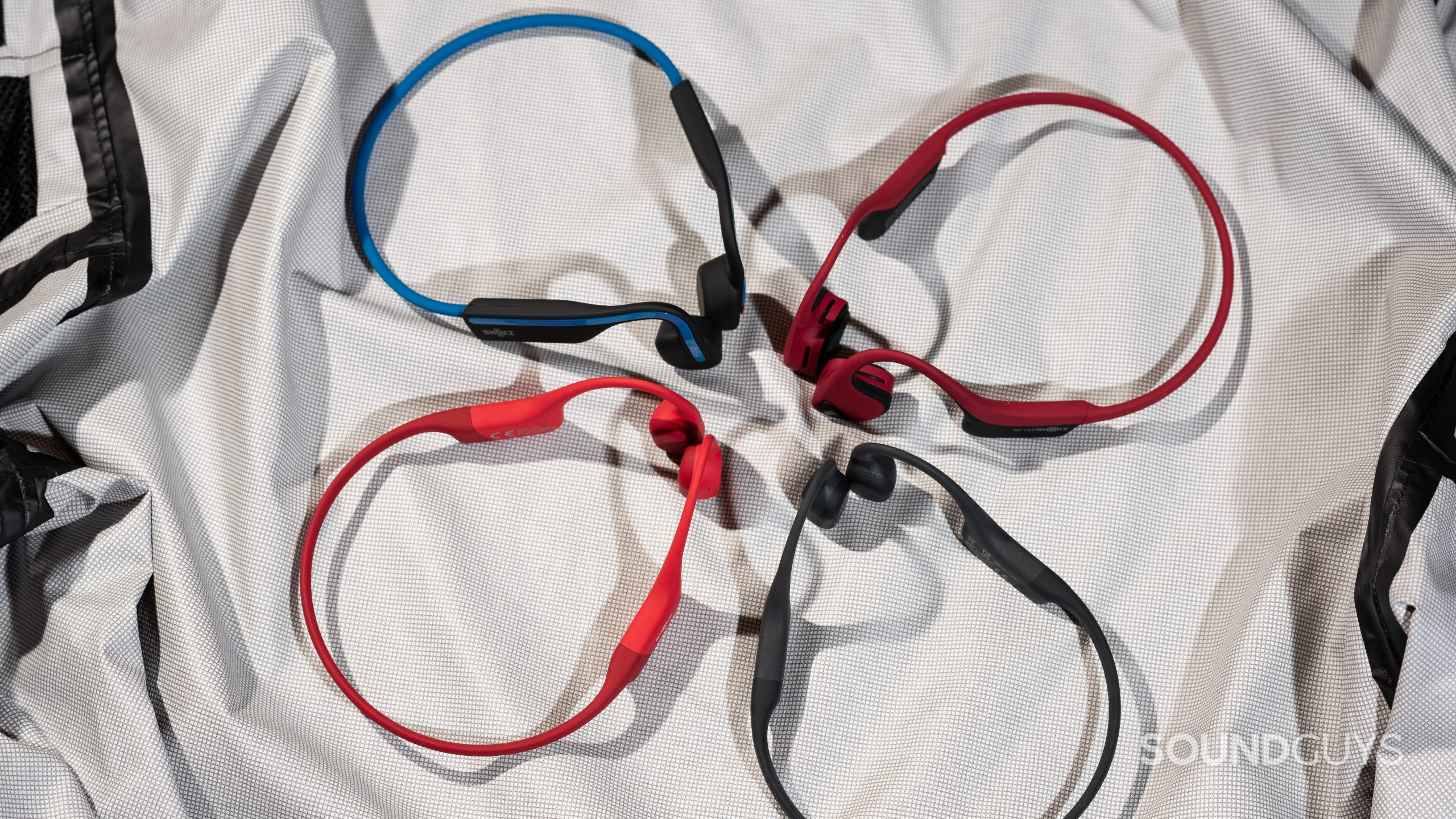
Let’s get the price out of the way: the OpenMove are more affordable than the Shokz OpenRun ($129 at Amazon). That added expense gets you a more durable IP67 rating, which means you can submerge the OpenRun in water for up to 30 minutes. The OpenRun aren’t swimming headphones since there’s no onboard storage.
Other features of the pricier OpenRun include fast charging, better battery life, 8th-generation bone conduction technology, and PremiumPitch 2.0+. While these are improvements, you don’t get USB-C charging on the OpenRun as you do with the OpenMove. Instead, you have to use Shokz’s outdated proprietary charging cradle, which is a minor annoyance.
Both Shokz headsets are compatible with Bluetooth 5.1 and SBC codecs. They also have virtually the same control layout, but the OpenMove buttons are easier to distinguish from one another. Unless you need the more impressive durability and battery life of the OpenRun, the OpenMove makes more sense for most people.
What should you get instead of the Shokz OpenMove?
Perhaps after sifting through this whole review, you’ve found that bone conduction headphones don’t quite fit the bill for you. In that case, let us direct you to the Sony LinkBuds WF-L900 ($178 at Amazon).
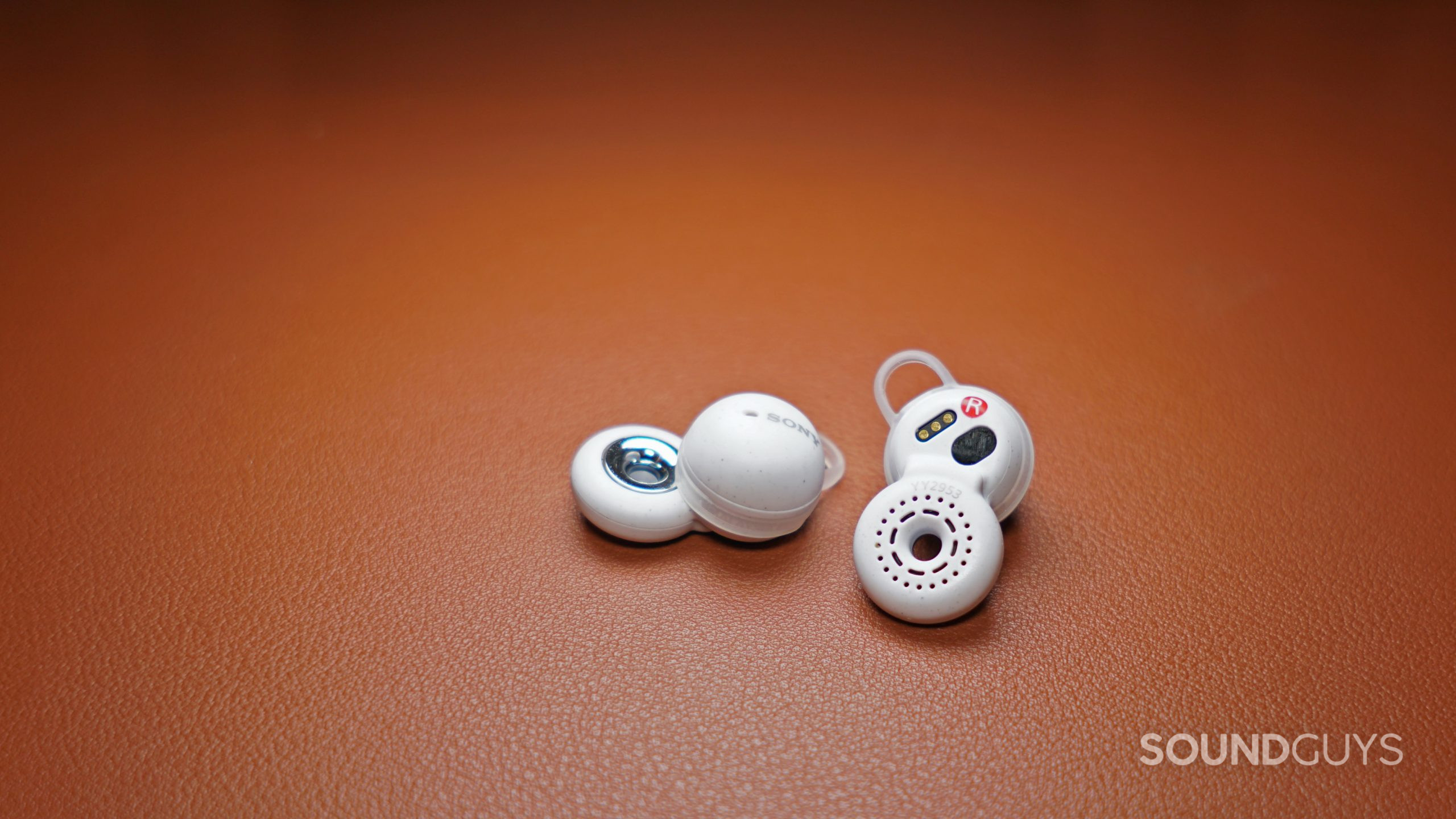
Sony’s niche buds fit like traditional earphones and rest against your outer ear, but a hole in each bud allows you to hear everything around you. Rather than sending vibrations through your skull, the LinkBuds send sound waves down your ear canal to interact with those little hairs in your ear. We like this because the fit is more stable and better for various exercises.
If you have an aversion to donut-shaped objects and own an iPhone, the Apple AirPods (3rd generation) could be appropriate for you. These earbuds feature a traditional true wireless design, stems and all. Although the fit isn’t as secure as the LinkBuds, the AirPods don’t seal to your ear canals either. That way, you can still hear the world around you. You’ll pay an Apple tax for these pricy pods ($195 at Amazon).
Frequently asked questions about the Shokz OpenMove
Yes, I wear them with glasses, and this works just fine. However, my glasses’ arms are rather thin, so if yours have thicker arms, you may experience some discomfort behind your ears.
The LED on the back of the right earpiece will illuminate blue when the headset is charged, red when it’s charging, and it will flash red when the battery is low.
To enable Bluetooth multipoint on the OpenMove, follow these directions:
- Start with OpenMove powered off.
- Press and hold the volume up button until the voice assistant says “pairing.” Wait for the LED to flash red and blue.
- Press and hold the multi-function and volume-up buttons for 3 seconds. The voice will say, “Multipoint enabled.”
- Open your phone’s Bluetooth menu and select “OpenMove by Shokz.” The voice prompt will say, “Connected.”
- Turn the OpenMove off.
- Re-enter the pairing process. Press and hold the volume up button until the voice assistant says “pairing.” Wait for the LED to flash red and blue.
- Open your phone’s Bluetooth menu and select “OpenMove by Shokz.” The voice prompt will say, “Connected.”
- Turn the OpenMove off.
- Turn the OpenMove on. It is now connected to both source devices.
When you want to disable Bluetooth multipoint, press and hold the multi-function and volume-up buttons for 3 seconds. The voice prompt will say,
“multipoint disabled.”
The OpenMove doesn’t have a dedicated hearing aid function that you can enable, but you can wear it with certain hearing aids since the OpenMove doesn’t occlude your ear canals.
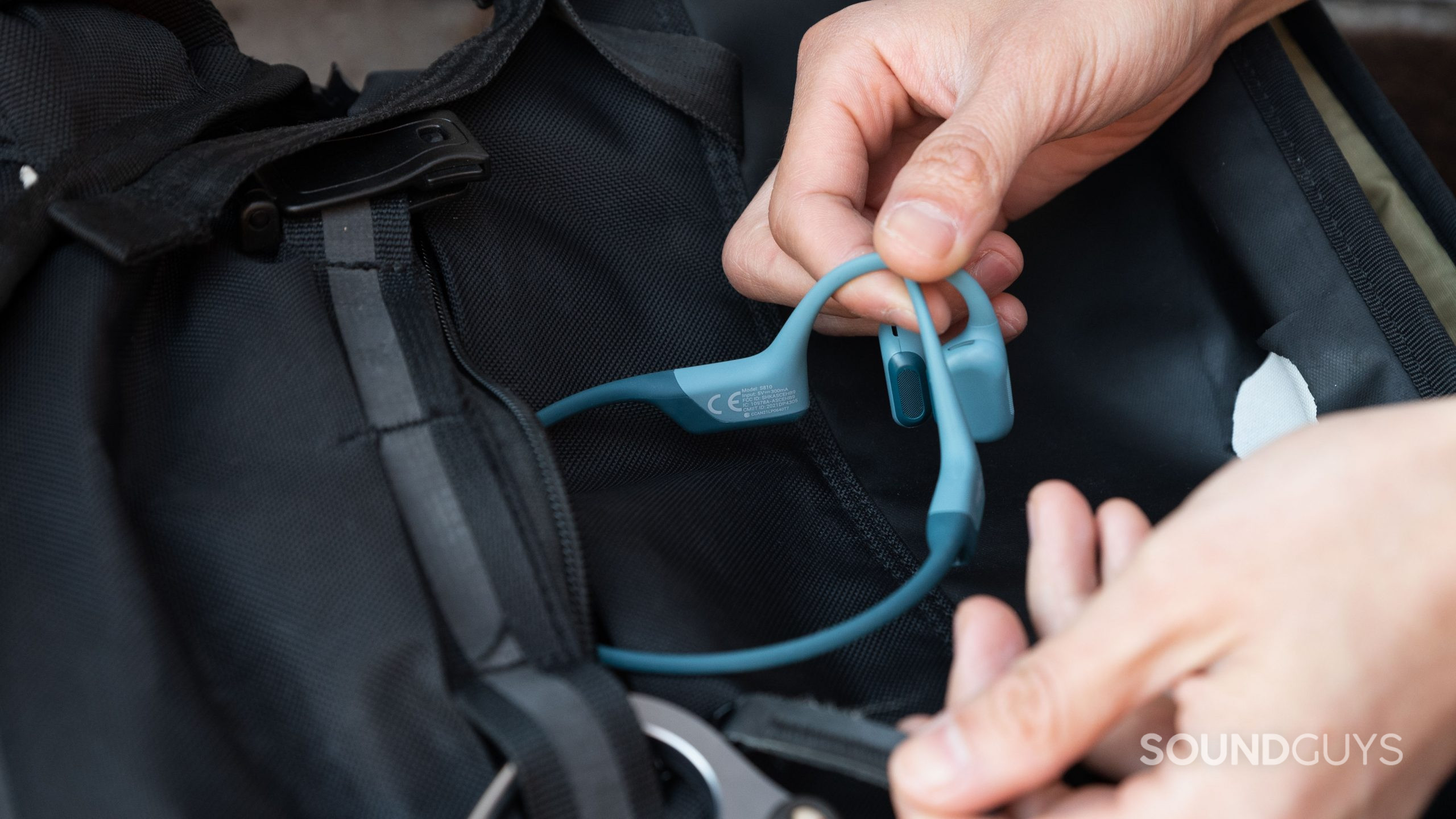
This depends on how you define the word better. We think the OpenMove has some important features that the OpenRun Pro lacks like a USB-C charging input.
The OpenRun Pro costs $179 at Amazon, which is generally twice the price of the OpenMove. For that price hike, you get more advanced (9th gen) bone conduction technology and a sleeker design. With the OpenRun Pro, you get a mobile app, but it doesn’t add any groundbreaking functionality that you miss out on with the cheaper OpenMove. The OpenMove and OpenRun Pro share the same IP55 durability rating, so if that’s the most important thing to you, you might as well save some money and get the OpenMove.
Yes, on December 28, 2021, AfterShokz renamed itself to Shokz. Shokz changed its name on its 10-year anniversary to lead into the next decade with a simplified and easier-to-share message than the former name “AfterShokz.” With this name change came a revamped logo to illustrate the bone conduction technology better.
Start with the headset powered off.
- Press and hold the volume up button until the voice prompt says, “pairing.” The LED indicator will flash red and blue.
- Press and hold the multi-function, volume up, and volume down buttons at the same time for 5 seconds until you hear two beeps or feel vibrations.
- Turn the OpenMove off.
Now, you’re ready to re-pair the OpenMove to your device like new.